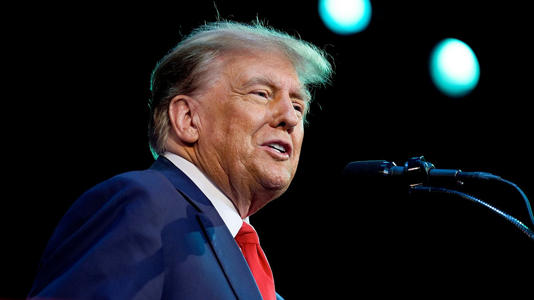Story by Liz Peek
Jamie Dimon scandalized Davos attendees last week: he said something nice about Donald Trump. All it took was two wars, sky-high inflation, millions of people entering our country illegally, out-of-control government spending and rampant crime in our big cities to make people realize how peaceful and prosperous our country was under the former president.
JPMorgan’s CEO told CNBC in an interview: “Take a step back, be honest. He was kind of right about NATO, kind of right on immigration. He grew the economy quite well. Trade tax reform worked. He was right about some of China.”
Yes, Trump was right on all those issues, and Biden has been dead wrong. Wrong on Iran, wrong on energy, wrong on the border, wrong on crime and wrong on the economy. You don’t earn the worst-ever approval ratings of a modern-day president by getting things right.
The Davos elites have now headed home in their private jets, having indulged in collective pearl-clutching – not about climate change this year — but rather about Donald Trump.
The consensus at the mountain-top gathering was that Trump will not only secure the GOP nomination, but that he will beat Joe Biden in November. (That prognosis should worry Trump supporters; more than one attendee noted that forecasts from the WEF crowd are almost always wrong. Joe Biden would fit right in.)
But here’s a surprise: U.S. business leaders, according to CNBC and other sources, are not alarmed about Trump 2.0, while their foreign counterparts are deeply worried.
Wonder why? Maybe because former President Trump put America first, and that proved a bonanza not only for the U.S., but indeed the world.
In 2018, Time magazine reported from Davos that the WEF participants that year were no longer anxious about the Trump presidency, which at that point was one year old. “Trump may represent the antithesis of everything the Davos crowd holds dear. But on the other hand, that crowd is making a lot of money these days,” wrote the reporter. He quoted an Israeli business executive saying, “I didn’t expect it, but he’s been successful, and this must be celebrated.”
American CEOS may also be reflecting a reality that has received very little attention, overwhelmed as it has been by bigger narratives.
President Biden, like Barack Obama before him, is a nightmare for U.S. private enterprise. Yes, Trump was erratic, but he understood how businesses work, that profits are essential to growth and that regulations can strangle prosperity. He understood that companies know how to reinvest their income better than D.C. bureaucrats and that economic growth is essential to rising incomes.
Biden’s blather about growing the economy from the “bottom up and middle out,” doesn’t even make sense. The “bottom” can only prosper if jobs are created by the top; the “middle” can only expand “out” when businesses bloom and employment grows. That hasn’t happened in recent decades; America’s middle class was slowly destroyed by globalist Democrats – like Joe Biden – who passed trade laws encouraging companies to ship manufacturing to China.
Biden now denounces those trade pacts he once embraced and is feverishly trying to reboot U.S. manufacturing. But during his presidency, manufacturing jobs have stagnated. In December 2019, before the COVID disruption, there were 12.9 million Americans working in manufacturing; four years later (December 2023) there were 13 million – that’s almost no change.
One of Biden’s biggest initiatives is to bring chip manufacturing to the U.S. To that end, the 2022 Chips Act directs over $50 billion to one of the world’s most profitable industries. Only the Biden team could allocate tens of billions of dollars to expand an industry that within months entered what the Financial Times described as “the sharpest slowdown in more than a decade.” Projects ballyhooed by the White House, like the TMSC plant in Arizona, are on hold.
Meanwhile, the Biden team wants to massively hike taxes on U.S. businesses, break up our biggest and best technology companies like Apple and Google and increase capital requirements for banks even as credit is tight and an economic slowdown looms.
Biden blames “greedy” businesses for jacking up prices and causing inflation, but that’s not true. Net after-tax profit margins on average when Biden took office were 9.9%; as of last August (latest available), they were 9.8%, essentially unchanged. Also, profits overall for U.S. firms have been roughly flat for seven quarters.
Business leaders are afraid of criticizing the Biden government, fearful of reprisals or worried they will miss out on the next round of goodies. That’s what happens when the government’s share of the economy expands; decisions are made for the wrong reasons and money is wasted.
Remember Biden gushing about electric-bus maker Proterra, which received millions of dollars from U.S. taxpayers but went bust anyway? More such failures in climate-related enterprises funded by the misnamed Inflation Reduction Act will surely follow.
Read More From PatriotAmerican
The Financial Times, under the banner headline, “The spectre of Trump hangs over Davos” declared ominously last week that “US business should be as concerned as those overseas about his possible return,” noting that Americans “sounded notably more sanguine” about his possible return than their foreign counterparts. True, they admitted, U.S. businesses “liked the tax cuts in Trump’s first term…the US economy performed well, stock prices rose.”
Yup, all we needed was three years of a bungling Biden White House to make Trump 2.0 seem like a great idea.

